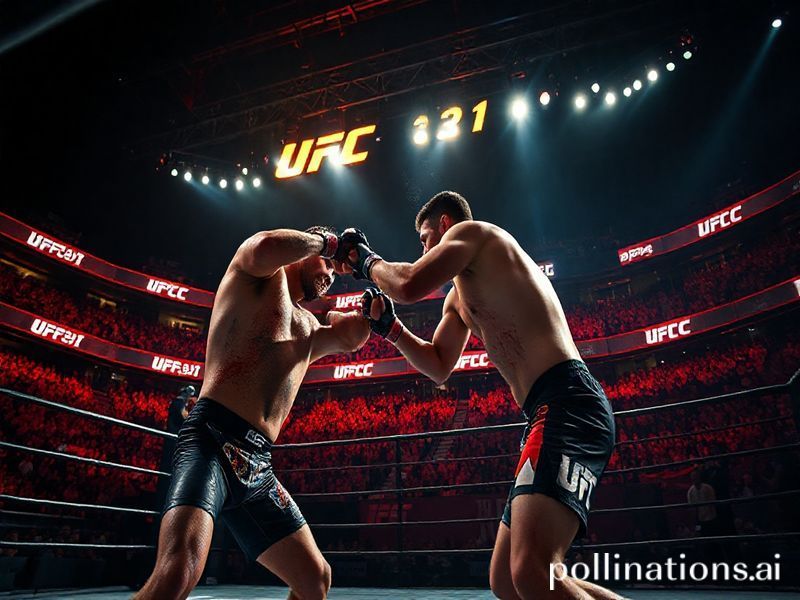UFC 321: How One Octagon in Abu Dhabi Became the UN of Organized Chaos
UFC 321: A Global Punchline in a Fractured World
by Marcello “The Guillotine” Ghirga
Abu Dhabi, 04:30 local—somewhere between the falafel stands and the $17 mojitos, the planet’s most profitable fistfight just ended, and the International Monetary Fund barely noticed. UFC 321, officially christened “Worlds Collide (Visa Fees Not Included),” rolled out the red carpet for 27 fighters from 19 countries, proving that while democracy sputters and supply chains implode, the only reliable export is still two consenting adults trying to rearrange each other’s nasal architecture for pay-per-view residuals.
The card opened with the feel-good bout of the evening: a Dagestani wrestler whose childhood nickname translates roughly to “Property Tax” versus a New Zealander whose tribal tattoos are insured by Lloyd’s of London. Three rounds later, both men needed new passports and the crowd learned that geopolitical tension can, in fact, be monetized at $79.99 in 4K. Somewhere in Brussels, an EU commissioner sighed into his decaf and wondered why agricultural subsidies can’t generate this sort of ROI.
Headlining the chaos was the interim interim interim lightweight title—yes, we’re on our third interim; at this point the belt is essentially a timeshare—between Brazil’s “Pious Armbar” Pereira and the USA’s reigning avatar of late-stage capitalism, Bryce “CryptoKing” Callahan. Pereira entered to a gospel choir; Callahan walked out flanked by two NFT gorillas. By the second round the gorillas looked more sentient than half the regulators trying to police them. When Pereira finally slapped on a triangle choke so tight economists called it quantitative easing, the crypto markets dipped 4%, which the UFC immediately spun as “blockchain engagement.”
Meanwhile, the undercard delivered its own diplomatic incidents. China’s first-ever female strawweight cracked a South Korean influencer’s orbital bone so cleanly that Weibo servers trembled—censors briefly mistook the applause for insurrection. Over in the heavyweight division, a polite Canadian apologized after turning a Congolese prospect’s liver into pâté, prompting a UN subcommittee to propose new sanctions on maple syrup.
The broadcast itself was a marvel of multinational synergy: commentary in five languages, gambling overlays in twenty-three currencies, and an octagon mat sponsored by a Dutch oil conglomerate currently on trial for ecocide. Every time the camera panned to Sheik Tahnoon in the VIP section, the geopolitical temperature rose two degrees; the man owns both the arena and the sovereign debt of at least two fighters’ home nations. Call it vertical integration, call it neo-feudalism—just don’t call it during a takedown attempt.
Backstage, the post-fight press conference resembled a UN summit after three days of catered amphetamines. A French journalist asked if mixed martial arts still counts as culture; Dana White answered in revenue projections. A Brazilian reporter inquired about fighter healthcare; the microphone short-circuited, possibly by coincidence. And when a British analyst dared mention unionization, security escorted him out past the merchandise stand selling $120 “Ethically Sourced Violence” hoodies stitched in Bangladesh for $3.
Yet for all the moral migraine, UFC 321 offered a rare, honest snapshot of globalization at its most carnivorous. Borders dissolve once the cage door shuts; currencies convert faster than a left hook; and shared humanity lasts exactly until someone checks their crypto wallet. The fighters themselves—jet-lagged, underpaid, and hailed as gladiators—are the only ones who still believe the story that talent trumps nationality. Bless their concussed little hearts.
As the desert city cooled and the last private jet lifted off toward whichever tax haven still answers the phone, one truth lingered like cigarette smoke in a Dubai sports bar: in a world that can’t agree on carbon limits, ceasefires, or basic facts, we can still rally around the timeless spectacle of two humans agreeing to bleed for our entertainment. It’s not progress, but at least the Wi-Fi is fast.
Conclusion: UFC 321 didn’t save the world; it merely monetized its decline with remarkable efficiency. And until the oceans boil or the streaming rights expire—whichever comes first—we’ll keep buying front-row seats to our own slow-motion collapse. After all, nothing says “international cooperation” quite like synchronized screaming over a rear-naked choke.







